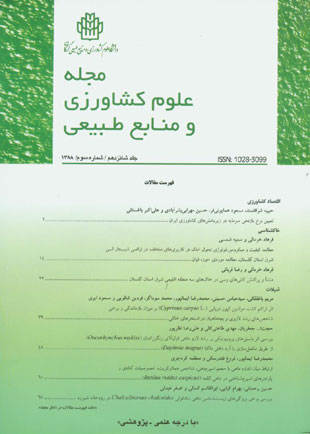Applicability of Vermicomposting Process in Recycling of Vegetables Wastes (Case Study-Vegetables Wastes from the City of Mashhad)
Author(s):
Abstract:
Over the last few years, the problem of efficient disposal and management of organic solid wastes has become a point of attention due to rapidly increasing population, intensive agriculture and industrialization. In this regard, vermicomposting has been reported to be a viable, cost-effective and rapid technique for the efficient management of the organic solid wastes. The current research was conducted to investigate the applicability of recycling of vegetables wastes (generated in the fruits and vegetables distribution market-City of Mashhad) and its conversion to organic fertilizer through vermicomposting process. The research was conducted in a complete randomized design with three types of substrate mixture (including: mixture of vegetable wastes and cow manure, mixture of vegetable wastes and composted material from the City of Mashhad Composting Facility, and mixture of vegetable wastes, cow manure and compost), four levels of vegetable wastes in each substrate mixture (including 20, 30, 40, and 50 percent vegetables wastes (on the basis of dry matter of total mixtures) and three replica for each type of treatment. The earthworms Eisenia fetida was used in this work. The C/N ratios in all the units were in the range of 20 to 30, a suitable range for the activities of the worms. The units with 100% vegetables wastes were considered as control units. The inoculation of earthworms was done in two step: a) initially, after preparation of the treatment units and b) after a pretreatment period of about 14 days, when the organic material were partially decopomsed. In each step, the treatment units were inoculated with 25 healthy earthworms of approximately the same size, having a total weight of 250 to 400mg. Temperature, pH, EC and percent moisture content of the units were measured regularly to ensure a suitable condition for the growth and reproduction of Eisenia fetida. The moisture content of the units was adjusted whenever it was needed. The results indicated that under the environmental conditions tested in this research, the vermicomposting process of vegetable wastes did not occure successfully. In all the treatment units, after a few days, the inoculated earthworms either died or escaped from the units. The reasons could be related to: a) the presence of certain aromatic comounds in vegetable wastes, b) the quick fetidness of vegetable wastes which could cause the release of harmful toxic gases and organic acids detrimental to the earthworms.
Language:
Persian
Published:
Journal of Agricultural Sciences and Natural Resources, Volume:16 Issue: 2, 2010
Page:
181
magiran.com/p690600
دانلود و مطالعه متن این مقاله با یکی از روشهای زیر امکان پذیر است:
اشتراک شخصی
با عضویت و پرداخت آنلاین حق اشتراک یکساله به مبلغ 1,390,000ريال میتوانید 70 عنوان مطلب دانلود کنید!
اشتراک سازمانی
به کتابخانه دانشگاه یا محل کار خود پیشنهاد کنید تا اشتراک سازمانی این پایگاه را برای دسترسی نامحدود همه کاربران به متن مطالب تهیه نمایند!
توجه!
- حق عضویت دریافتی صرف حمایت از نشریات عضو و نگهداری، تکمیل و توسعه مگیران میشود.
- پرداخت حق اشتراک و دانلود مقالات اجازه بازنشر آن در سایر رسانههای چاپی و دیجیتال را به کاربر نمیدهد.
In order to view content subscription is required
Personal subscription
Subscribe magiran.com for 70 € euros via PayPal and download 70 articles during a year.
Organization subscription
Please contact us to subscribe your university or library for unlimited access!


